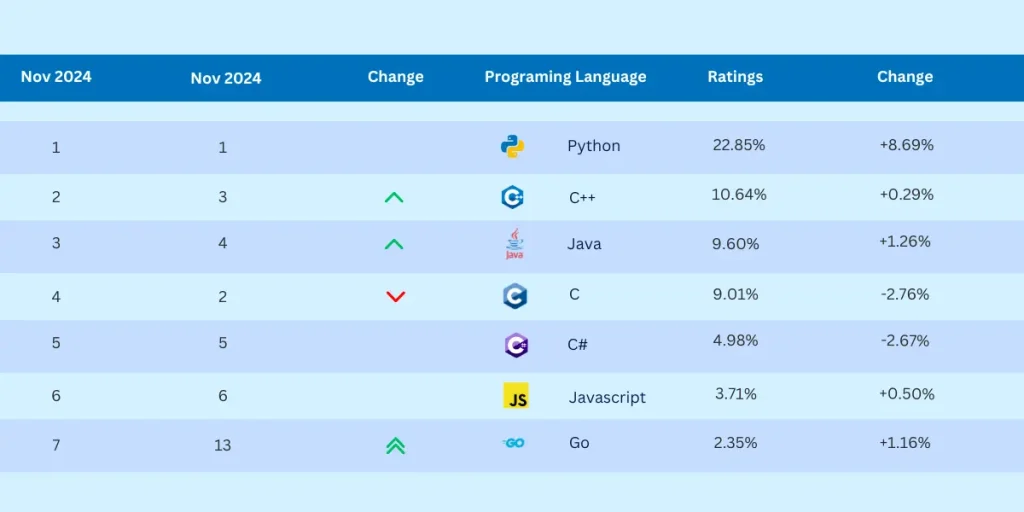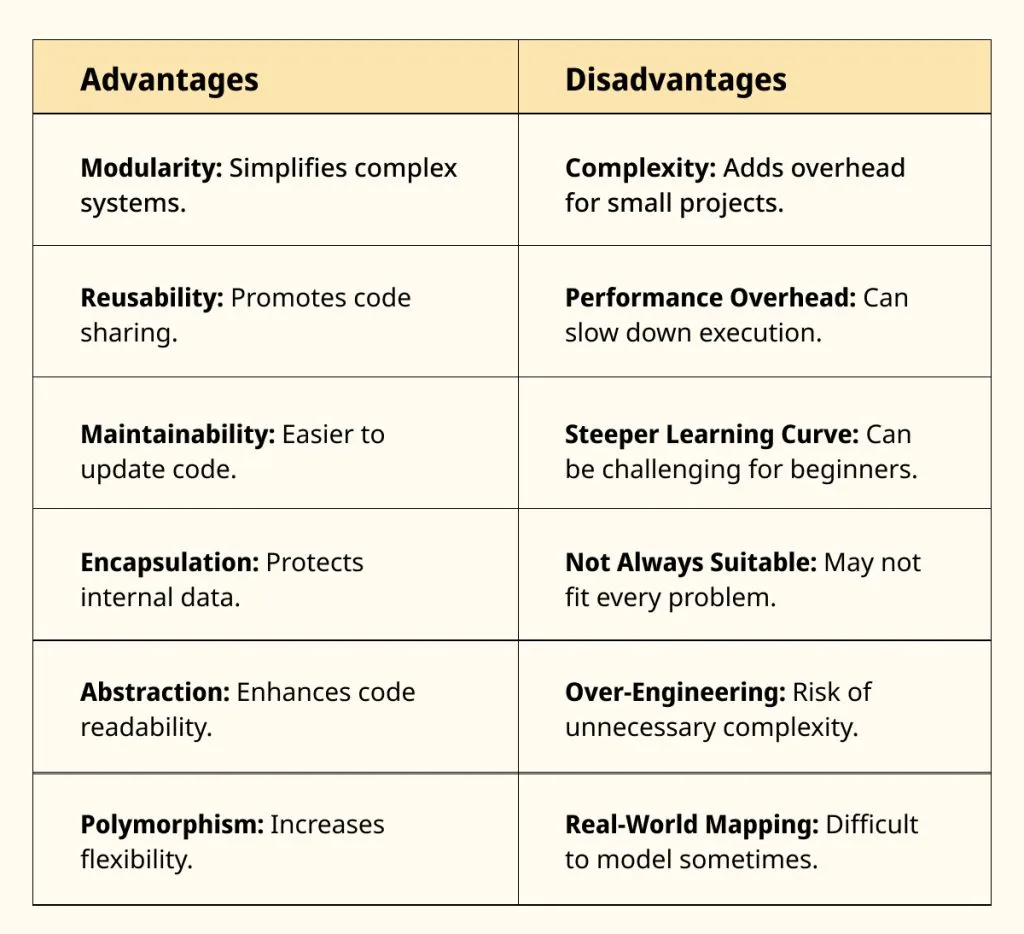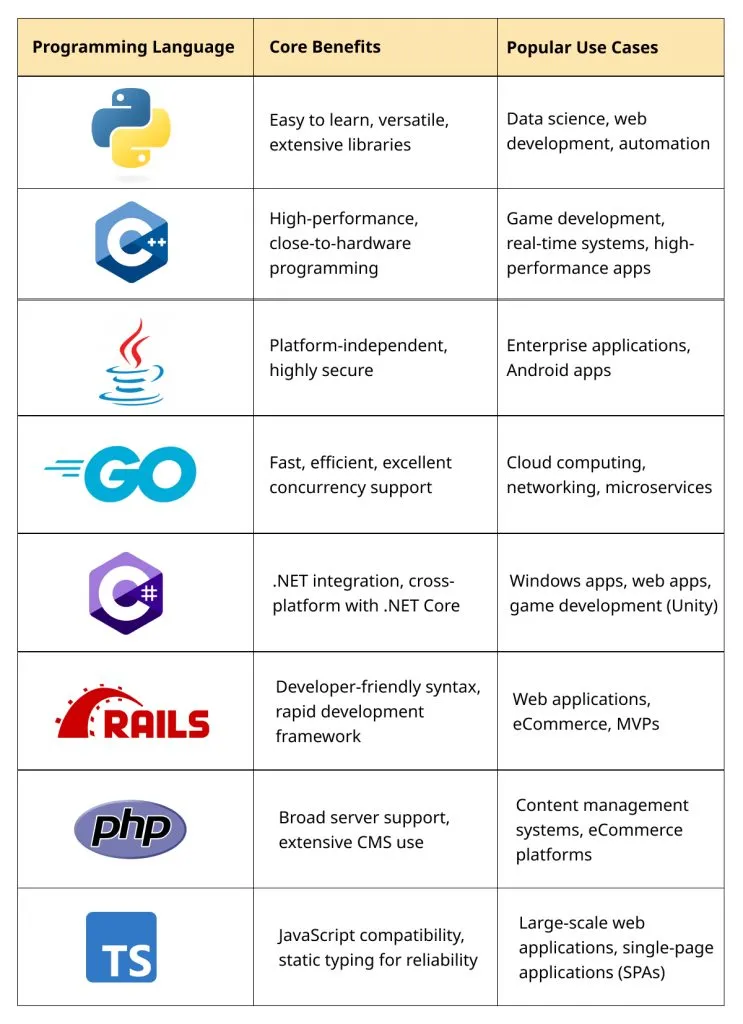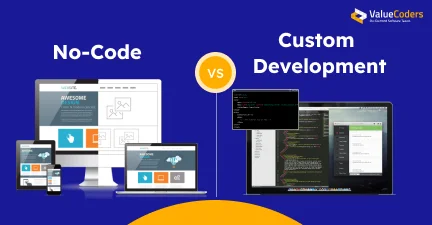The TIOBE Programming Community Index ranks Python, C++, Java, C, C#, JavaScript, and others among the top object-oriented programming languages for developing applications of all sizes, from small projects to large-scale systems.
In today’s fast-paced business environment, choosing the right custom software development services language is crucial for companies looking to improve their operations and bring innovation.
Businesses often face challenges like increasing competition, the need for scalable solutions, and the demand for quick turnaround times. Therefore, using the right technology becomes essential.
Object-oriented programming (OOP) provides a framework that improves flexibility. It allows businesses to adjust and grow while ensuring a powerful and easy to maintain applications.
This blog will explore the best OOP languages that can drive innovation and streamline your organization’s operations. By understanding these languages’ strengths and applications, businesses can make wise decisions about technology investments and development strategies.
Whether you’re looking to improve existing systems or launch new projects, this guide will help you with the insights needed to utilize the power of OOP and position your business for success in a competitive marketplace.
Introducing Object-Oriented Programming Languages
Object-oriented programming (OOP) is a paradigm that utilizes “objects” to represent data and methods for manipulating that data. This approach facilitates better code organization, making it easier to manage complex software systems. By focusing on objects, OOP lets developers build modular code that can be reused across various projects, thus reducing redundancy and enhancing efficiency.
Key features of OOP include:
- Encapsulation: This is a principle in which data and the methods that work with that data are kept together in a single unit or class. It limits direct access to some parts of an object, helping to protect the data and making it easier to debug.
- Inheritance: Inheritance is a feature that lets a new class use the properties and behaviors of an existing class. This helps save time by reusing code and makes the code easier to manage by creating a clear structure among classes.
- Polymorphism: This concept allows objects to be used as if they are part of their parent class, even if they belong to a different subclass. This makes code simpler and more flexible by letting methods work with objects from different classes.
- Abstraction: Abstraction focuses only on the important details of an object, hiding any unnecessary complexity. This helps simplify development, allowing programmers to focus on the main logic without needing to know every detail of how things work behind the scenes.
Overall, object-oriented programming languages provide a powerful framework for building scalable, maintainable, and efficient software solutions. By using these languages, businesses can better address their challenges and drive innovation across various applications.
Get tailored solutions from our OOP experts. Let's start building your app today.
Advantages and Disadvantages of OOP Languages:
The most significant advantages and disadvantages of the OOP language are:
Top 8 Object-Oriented Programming Languages
Now, let’s have a look at the leading OOP languages list that empower businesses to build scalable, efficient, and innovative software solutions. Each language offers unique features and advantages, making them essential tools for modern development.
1. Python
Python is one of the most popular object-oriented programming languages for offering cross-platform, simple, and versatile features. Known for its clear syntax and readability, Python lets developers to write code efficiently, making it an exceptional choice for beginners and experienced programmers alike.
Key Features:
- Easy to Learn and Use: Python’s easy syntax reduces the learning curve, letting businesses to quickly hire Python developers and fasten project timelines.
- Rich Libraries and Frameworks: Python offers a vast ecosystem of libraries and frameworks, like Django for web development and TensorFlow for machine learning, enabling rapid application development across various domains.
- Strong Community Support: With a large and active community, Python developers benefit from extensive resources, documentation, and forums, fostering collaboration and knowledge sharing.
Business Applications: Python’s flexibility suits various applications, from data analysis and artificial intelligence to web and software development. Many organizations use Python development services to streamline processes, improve productivity, and drive innovation, making it an invaluable asset.
Also read: Python Vs Java
Here’s an example of how to define a class in Python:
class Bird: pass Here you can also use Instance attributes to define characteristics: class Bird: # Initializer / Instance Attributes def __init__(self, type, color): self.type = type self.color = color I hope you have some clarity now on why Python is an OOP language. It works on the concept of object-oriented programming fundamentals. And will be valuable to you in a variety of Python app development circumstances.
By adopting Python, businesses can utilize its object-oriented features to create scalable and maintainable applications, leading to more efficient operations and improved outcomes.
Our experts can integrate Python's powerful OOP features to build scalable applications.
2. C++
C++ is a powerful, high-performance, object-oriented programming language widely used for system and application software. Known for its speed and control over system resources, C++ is ideal for complex applications that demand high efficiency and reliability.
Key Features:
- Performance-Driven: C++ offers exceptional speed and low-level memory control, making it perfect for applications where performance is critical.
- Rich Standard Library: Equipped with a robust standard library, C++ provides extensive functionality that allows c++ developers to easily build complex systems.
- Flexibility and Scalability: With support for both procedural and object-oriented programming, C++ is highly adaptable, making it suitable for both small-scale projects and large, enterprise-level applications.
Business Applications: C++ is commonly used in industries requiring high-performance computing, such as finance, gaming, telecommunications, and automotive. It powers operating systems, embedded systems, and real-time applications, giving businesses the reliability and speed necessary for demanding environments.
Here is an example of adding Classes and Objects:
//Class name is Automobile
class Automobile
{
//Data members
char name[20];
int speed;
int performance;
public:
//Functions
void brake(){
}
void slowDown(){
}
};
int main()
{
//honda is an object
Automobile honda;
}
With C++, businesses gain a language that supports both resource-intensive applications and scalable, maintainable code, making it an enduring choice for strong software solutions.
3. Java
Java is a versatile, platform-independent, object-oriented programming language known for its stability and scalability. Its “write once, run anywhere” capability allows Java applications to run on any operating system or device that supports Java, making it a top choice for enterprise-level solutions.
Key Features:
- Platform Independence: Java’s cross-platform capabilities allow applications to operate seamlessly across different devices, reducing development time and costs.
- Strong Security: With built-in security features, Java is highly reliable for applications that handle sensitive data or require robust security.
- Extensive Libraries and Frameworks: Java’s vast library ecosystem and popular frameworks, like Spring and Hibernate, allow developers to build robust applications quickly.
Business Applications: Java web development services is widely used in finance, healthcare, and eCommerce due to its reliability and scalability. From mobile applications and large-scale enterprise systems to cloud-based solutions, Java supports various applications, making it a go-to language for businesses that aims to deliver consistent, high-performance software.
By choosing Java, businesses can create scalable and secure applications that grow with their needs, ensuring long-term value and stability.
Want to build your app? ValueCoders, a software development company, offers experienced Java web developers for startups and SMEs.
Also read: Java 10: New Features And Enhancements
4. Golang (Go)
Golang, or Go, is a modern, high-performance programming language developed by Google. Known for its efficiency and simplicity, Go is ideal for building scalable, concurrent applications. While not purely object-oriented, Go supports essential OOP principles, allowing businesses to create maintainable and flexible codebases.
Key Features:
- Concurrency Support: Go’s built-in concurrency capabilities make it an excellent choice for applications that need multiple processes, such as network servers and data pipelines.
- Fast Compilation: Go’s simplicity and efficiency lead to faster compilation times, smooth development, and reduced delays.
- Memory Efficiency: With minimal memory overhead, Go is ideal for systems that demand high performance and efficient resource use.
Business Applications: Golang is widely used for cloud computing, distributed systems, and backend development. Its speed, simplicity, and reliability make it suitable for industries like finance, tech, and media, where efficiency and performance are crucial.
Here’s an example of Object-Oriented Programming in Golang:
type Bird struct {
Name string
mean bool
}
type Sparrow struct {
Basics Bird
ChirpsStrength int
}
type Parrot struct {
Bird
ChirpsStrength int
}
For businesses, Go offers high-performing application development that scales effortlessly, supporting long-term growth and responsiveness to market demands. Choose ValueCoders for experienced Golang web developers to build your dream application.
5. C#
C# is a versatile, fully object-oriented language developed by Microsoft, primarily used for building Windows applications but equally powerful for web and mobile development. Known for its robustness and strong integration with the .NET framework, C# is popular among enterprises for creating scalable, feature-rich applications.
Key Features:
- Seamless .NET Integration: C# works smoothly with the .NET ecosystem, giving developers access to various tools and libraries that enhance productivity.
- Automatic Memory Management: C#’s garbage collection system automates memory management, reducing potential errors and simplifying development.
- Cross-Platform Compatibility: With .NET Core, C# now supports cross-platform development, making it possible to run applications on Windows, macOS, and Linux.
Business Applications: C# is widely used for enterprise software, web applications, game development (with Unity), and mobile apps, especially within the Windows environment. Its stability, extensive library support, and cross-platform capabilities make it a reliable choice for businesses looking to build resilient and scalable applications.
When you hire C# developers, it allows businesses to utilize Microsoft’s powerful ecosystem to deliver secure, high-performance applications across various platforms.
Also read: Node.js vs. Golang
ValueCoders can help you maximize your development efforts with expert guidance.
6. Ruby (Ruby on Rails)
Ruby, especially popularized through the Ruby on Rails framework, is an elegant, object-oriented programming language known for its simplicity and productivity. Ruby on Rails (Rails) has redefined web development by offering a convention-over-configuration approach, accelerating the development process and simplifying the coding structure.
Key Features:
- Developer-Friendly Syntax: Ruby’s readable and intuitive syntax improves productivity and reduces development time, making collaboration easier for teams.
- Convention Over Configuration: Rails minimizes configuration needs, hire Ruby on Rails developers to focus on building features rather than handling setup tasks.
- Comprehensive Libraries: Rails offers numerous libraries and built-in solutions for common web development tasks, speeding up the creation of robust applications.
Business Applications: Ruby on Rails is popular for building eCommerce platforms, social networking sites, and content management systems. Startups and enterprises alike appreciate Rails for its rapid development cycle, making it ideal for MVPs, quick deployments, and scalable web solutions.
Let’s see how objects are created in Ruby:
class Bike def initialize(name, color) @name = name @color = color end
def get_info "Name: #{@name}, and Color: #{@color}" endend
my_bike = Bike.new("Apache", "Blue")puts my_bike.get_info
For businesses, Ruby on Rails offers an efficient path to creating user-friendly, scalable web applications, helping them bring products to market faster and adapt quickly to changing user needs.
Further coding steps in Ruby will include accessing data, class methods and class variables, class inheritance, modules, and the scope of constants. Contact top-notch Ruby on Rails (RoR) developers to work for you for more info and help with Ruby’s application development.
7. PHP
PHP is a widely used, object-oriented scripting language designed for web development. It powers nearly 75.7% of websites globally. Known for its flexibility and ease of integration, PHP web development services remain a top choice for businesses targeting dynamic and interactive web applications.
Key Features:
- Ease of Use: PHP’s simple syntax and extensive documentation make it accessible, reducing development time and costs.
- Broad Server Support: PHP is compatible with most of the web servers, databases, and operating systems, making it a versatile choice for various deployment environments.
- Large Ecosystem: With frameworks like Laravel and Symfony, PHP offers tools to speed up development and improve application functionality.
Business Applications: PHP is commonly used for content management systems (like WordPress), eCommerce platforms, and web applications. Its versatility and cost-effectiveness make it popular across industries, especially for websites that require scalability and continuous updates.
When you hire dedicated PHP developers, it enables businesses to develop scalable, dynamic web solutions quickly and affordably, supporting diverse needs from small sites to enterprise-level applications.
Also read: PHP Is Incredibly Better Than Its Other Alternatives
Leverage the flexibility of OOP languages to future-proof your software. Let’s discuss your needs.
8. TypeScript
TypeScript, a superset of JavaScript, brings object-oriented programming principles to JavaScript, enhancing code structure, reliability, and scalability. Developed by Microsoft, TypeScript is widely adopted for web and frontend development. You can hire Typescript developers to build powerful applications that offer scalability and maintainability..
Key Features:
- Static Typing: TypeScript’s optional static typing helps catch errors early in the development process, improving code quality and reducing bugs.
- Improved Readability and Maintainability: The language’s structured syntax improves code readability, making it easier for teams to collaborate on complex projects.
- Seamless JavaScript Compatibility: A TypeScript development company compiles JavaScript, ensuring compatibility with existing JavaScript libraries and frameworks like React, Angular, and Vue.
Business Applications: TypeScript is widely used for developing large-scale, interactive web applications, especially single-page applications (SPAs). Its strong typing and improved tooling support make it ideal for applications requiring high-quality code, such as enterprise-level platforms and dynamic web applications.
For businesses, TypeScript combines JavaScript’s versatility with increased reliability, making it a powerful tool for developing scalable, maintainable web solutions.
Want to build a web app using one of these object-oriented programming languages list? Connect with ValueCoders, which offers custom application development services for startups, SMEs, and large-scale enterprises.
Summing Up
Selecting the right programming language is important for building scalable, secure, and high-performing applications that meet business needs. From Python’s simplicity and versatility to Java’s platform independence and C++’s performance capabilities, each language offers unique advantages.
Emerging languages like TypeScript and Golang offer modern solutions for specific challenges, while industry favorites like PHP and Ruby on Rails continue to provide reliable frameworks for web development.
Understanding these languages’ strengths helps businesses choose the right technology stack, optimize development efforts, and achieve faster time to market.
At ValueCoders, we specialize in using these top pure object-oriented languages to create tailored software solutions across industries. By staying informed on the latest languages and trends, businesses can build future-ready applications that drive growth and innovation.

















